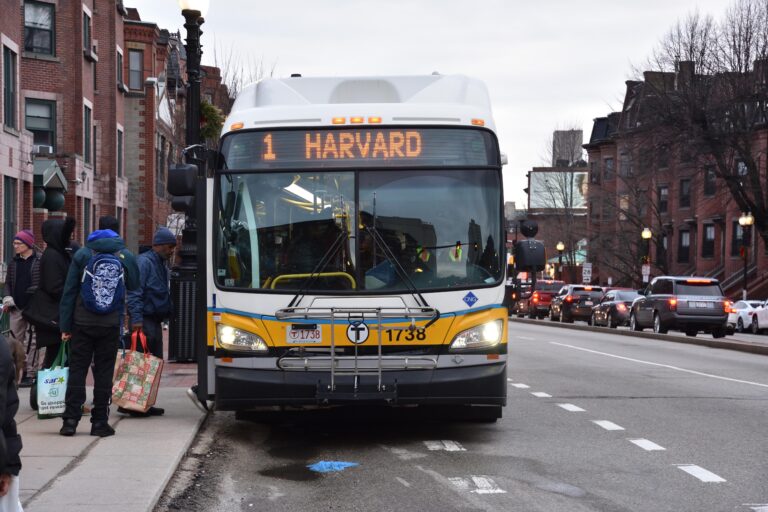Boston is accelerating efforts to enhance public transit efficiency with new initiatives aimed at boosting bus speed and reliability across the city. Recent announcements by the Massachusetts Bay Transportation Authority (MBTA) outline strategic measures designed to reduce wait times at traffic signals and streamline service on key routes.These improvements are expected to substantially cut travel times for commuters, reflecting Boston’s ongoing commitment to modernizing its transit infrastructure and improving rider experience. The initiatives mark a critical step forward in addressing longstanding challenges in the city’s bus network, ensuring faster, more dependable service for thousands of daily passengers.[2]
Table of Contents
- Boston Unveils New Dedicated Bus Lanes to Reduce Traffic Delays
- Technology Integration Aims to Improve Real-Time Bus Tracking and Scheduling
- Community Feedback Shapes Priorities for Bus Route Optimization
- City Officials Recommend Strategic Infrastructure Investments for Long-Term Transit Success
- Wrapping Up
Boston Unveils New Dedicated Bus Lanes to Reduce Traffic Delays
Boston has taken a significant step toward alleviating urban traffic congestion by launching new bus-exclusive lanes across several high-traffic corridors. This initiative aims to minimize delays and enhance the overall speed and reliability of public transit services. City officials emphasize that these dedicated lanes will not only improve punctuality for bus riders but also encourage a modal shift away from private vehicles, perhaps leading to broader reductions in road congestion and emissions.
The programme rollout includes:
- Strategically marked bus lanes prioritized during peak hours.
- Enhanced signage and enforcement measures to prevent unauthorized vehicle use.
- Real-time monitoring to assess lane effectiveness and make timely adjustments.
Early feedback from transit users indicates quicker commute times and a smoother travel experience. City planners remain committed to expanding this model, aiming to create a more efficient and environmentally sustainable transit network that benefits all Boston commuters.
Technology Integration Aims to Improve Real-Time Bus Tracking and Scheduling
Boston’s transit authorities are deploying cutting-edge technology to modernize bus tracking and scheduling systems, enhancing operational efficiency and commuter experience. The integration of GPS and mobile technology enables passengers to view real-time bus locations, allowing for more precise arrival predictions and informed travel decisions. This advancement is supported by data analytics tools that optimize scheduling and route adjustments dynamically according to traffic patterns and demand fluctuations.
Key technological elements underpinning this initiative include:
- Mobile applications providing live tracking and online ticketing options
- Cellular communications facilitating continuous data transmission between buses and control centers
- Data archiving and analysis for performance monitoring and future route improvements
These tools collectively aim to reduce wait times, improve schedule adherence, and increase overall reliability for Boston’s bus network, reinforcing the city’s commitment to seamless urban transit management.
Community Feedback Shapes Priorities for Bus Route Optimization
Boston’s transit authorities have prioritized direct input from residents and daily commuters to identify key bottlenecks affecting bus speed and reliability. Community forums and surveys revealed that passengers seek improvements in route frequency, stop placement, and real-time facts accuracy. Many voiced concerns over delays caused by unpredictable traffic patterns and insufficient bus lanes in high-density corridors.These insights have directly influenced the city’s approach to redesigning routes, particularly focusing on areas with the highest reported wait times and overcrowding.
Residents also emphasized the importance of integrating equitable access and safety features into bus services. Feedback highlighted the need for:
- Improved lighting and shelters at bus stops
- Enhanced connectivity with other transit modes
- Clearer signage and communications to reduce rider confusion
By incorporating this community-driven data, Boston aims to sharpen the focus on practical, impactful solutions that increase bus system reliability while ensuring equitable service across neighborhoods.
City Officials Recommend Strategic Infrastructure Investments for Long-Term Transit Success
City officials have underscored the critical need for targeted infrastructure investments to transform Boston’s public transit landscape. By prioritizing key enhancements such as dedicated bus lanes, upgraded traffic signal systems, and modernized transit hubs, the administration aims to untangle chronic congestion and enhance overall service efficiency.These improvements are designed not only to speed up bus travel times but also to bolster reliability,creating a seamless,user-friendly experience for daily commuters and casual riders alike.
Strategic priorities include:
- Developing and expanding Bus Rapid Transit (BRT) corridors to ensure faster, more predictable service
- Implementing advanced signal priority systems that adjust in real time to improve bus flow
- Upgrading bus stops with enhanced shelters, real-time arrival information, and better accessibility
- Improving connectivity across transportation modes to support integrated, multi-modal travel
These recommendations are grounded in data-driven research and community engagement, reflecting a commitment to equity and sustainability. The investments are seen as vital for long-term transit success, helping Boston meet rising demand and reduce environmental impact while fostering a more dynamic and connected city.
Wrapping Up
As Boston moves forward with its plans to enhance bus speed and reliability, these initiatives signal a significant step toward improving public transit for thousands of daily riders. By prioritizing efficient and dependable service, the city not only aims to alleviate congestion but also to provide a more sustainable transportation option for residents and visitors alike. As these efforts unfold,Boston’s commitment to modernizing its transit infrastructure will be a key factor in shaping the future of urban mobility in the region. For more information on Boston’s transportation projects and city updates, visit official resources at Boston.gov[[1]] and CityofBoston.gov[[2]].

